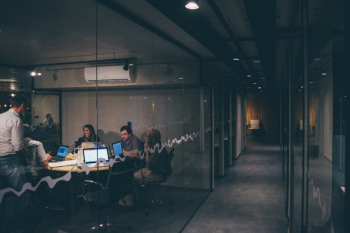Coworking spaces can a great alternative to working from home or a more rigid office structure; facilitating a more creative and collaborative atmosphere across all its users. With our reliance on technology, we can leave ourselves open to security issues if we don’t take steps to protect ourselves. That said when it comes to coworking space security, the buck (and key responsibility) stops with the space owner. Clients need to feel safe in their workspace. Regardless of whether they are hot-desking, using an open and collaborative space or private office within a larger office space a secure coworking office is essential. All good coworking spaces will have an established security policy to ensure that all of its user’s items and intellectual property are protected. It is this added security and protection, coupled with a more open yet productive working environment, that has attracted people away from working at home or in the local coffee shop.
Through The Eyes Of The Coworking Space Coordinator
Owning a coworking office can be stressful but it can also be extremely fulfilling. As with any office the most difficult thing is striking that balance between what is best for the business and what your users want. A coworking space should feel safe and comfortable while also being secure, but some users will have their own view on what equates to good office security. Therefore, one of the key components to managing a successful coworking space is extending and facilitating trust while setting clear boundaries both physically and virtually.
Simple features such as keycards, access codes or smartphone codes while also sharing come ‘common sense’ security tips to all users; is a great first step while also setting a strong first impression. Additional measures may need to be taken, for example;
- Is there is secure storage for electronics such as laptops?
- Are there any additional security measures such as video monitoring, motion sensors or security guards?
But what happens if someone forgets their access card or code? With the evolution in technology and interconnectivity, some security systems offer additional features such as a remote control dashboard where users can get a temporary access code on their phone.
Why Is Coworking Security Important?
No matter what angle you look at; data in all its forms, physical and digital, is valuable. With our complete reliance on technology, we can leave ourselves, and our valuable data, vulnerable to security attacks. This is one of the key concerns many coworking space users have; especially when it comes to wifi. However, there is a very simple solution to this, in the form of dedicated VLAN access.
Coworking office space users need to feel safe and secure within their working environment in order to be productive and keep using the space.
Defining A Coworking or Sharded Offices Security Needs
Regardless of the size of coworking space, most owners strive to create an open, friendly and collaborative space. To do this you have to find that difficult balance between setting boundaries and fostering the type of atmosphere you want throughout the office space. A great way to do this is to put yourself in your client’s shoes, look at the space through their eyes, what are their essential needs? What elements could be an added bonus or additional incentive? Remember, you can always turn to current clients for feedback and suggestions.
Steps For A Physical Secure Workplace
There are simple steps that any owner of a coworking space can do to help their users feel more secure in their workplace. These include:
- Good, well-lit spaces
- Motion detector alarms
- Closed-door policy (access with key-card, access code etc)
- Video monitoring
- Secure storage options for expensive items or tech
Steps For A Secure Data and Digital Workplace
Statistically, most cyberattacks come from inside the network but there are steps that you can take to ensure a secure network for all your office space users. These include:
- Secure password protection (eg hard to crack, changed regularly)
- Separate network(s) for smaller companies, freelancers, non-members and visitors
- Double authentication to protect higher risk areas, equipment or internal offices (which might handle sensitive data. For example, a lawyer, councillor, or financial advisor)
- Separate virtual networks for each company
- IP filtering systems
No matter how you look at it, all forms of security are important to a user; whether they are a drop in client or a long term renter.
Whats Next?
Once you have defined your security needs, established your policies and implemented all security measures you will need to:
- Notify existing clients regarding the new procedures.
- Ensured all existing staff have the required and appropriate codes, key cards, levels of access etc
- Establish a notification procedure for changing important passwords, such as wifi, on a regular basis
- Create a resource for users (current and new) where they can access information about the security measures and policies in place. You could do this via email or an online portal.
Finally, remember that you should always be reviewing your office space security policies to reflect changes in security threats and client needs and demands. Once you have taken all these steps you, and your clients, will be safe in the knowledge that your coworking space is secure both physically and virtually.

